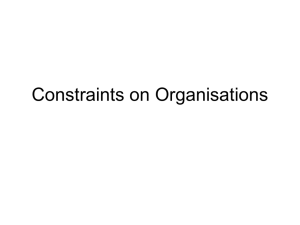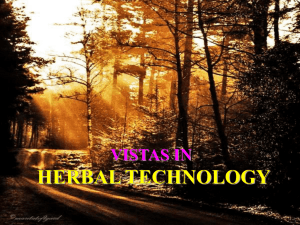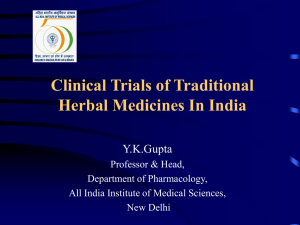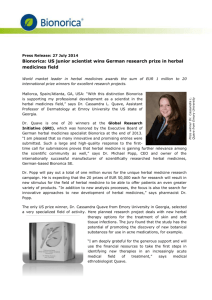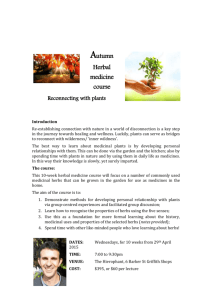Public Statement from dissenting members of the Herbal Practitioner
advertisement
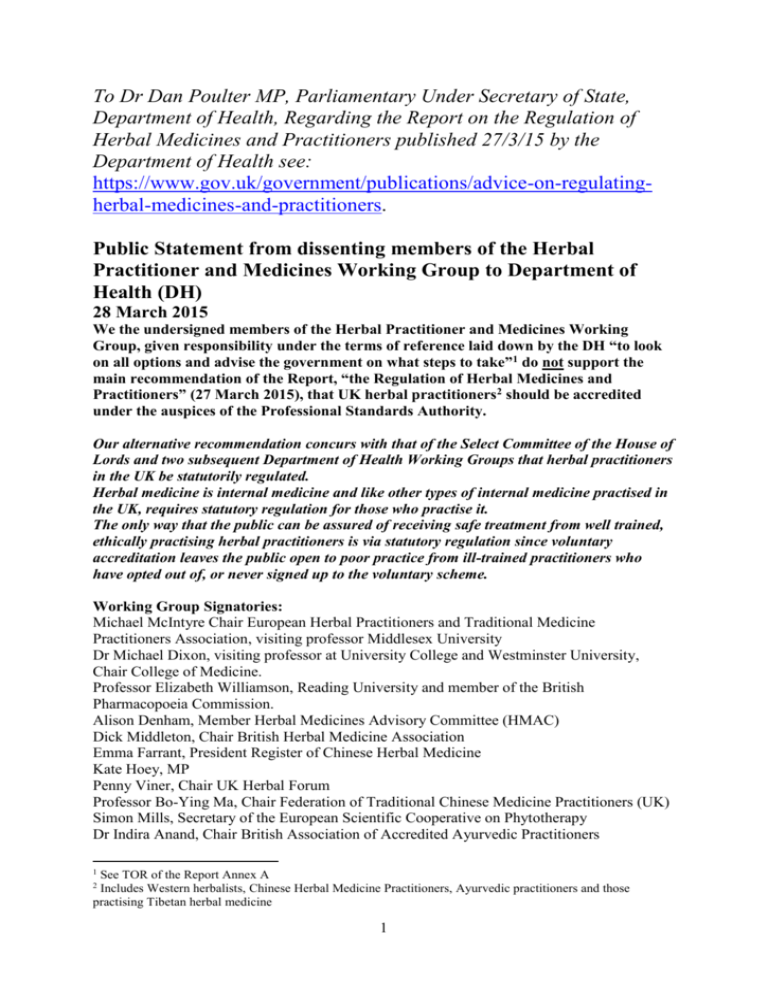
To Dr Dan Poulter MP, Parliamentary Under Secretary of State, Department of Health, Regarding the Report on the Regulation of Herbal Medicines and Practitioners published 27/3/15 by the Department of Health see: https://www.gov.uk/government/publications/advice-on-regulatingherbal-medicines-and-practitioners. Public Statement from dissenting members of the Herbal Practitioner and Medicines Working Group to Department of Health (DH) 28 March 2015 We the undersigned members of the Herbal Practitioner and Medicines Working Group, given responsibility under the terms of reference laid down by the DH “to look on all options and advise the government on what steps to take”1 do not support the main recommendation of the Report, “the Regulation of Herbal Medicines and Practitioners” (27 March 2015), that UK herbal practitioners2 should be accredited under the auspices of the Professional Standards Authority. Our alternative recommendation concurs with that of the Select Committee of the House of Lords and two subsequent Department of Health Working Groups that herbal practitioners in the UK be statutorily regulated. Herbal medicine is internal medicine and like other types of internal medicine practised in the UK, requires statutory regulation for those who practise it. The only way that the public can be assured of receiving safe treatment from well trained, ethically practising herbal practitioners is via statutory regulation since voluntary accreditation leaves the public open to poor practice from ill-trained practitioners who have opted out of, or never signed up to the voluntary scheme. Working Group Signatories: Michael McIntyre Chair European Herbal Practitioners and Traditional Medicine Practitioners Association, visiting professor Middlesex University Dr Michael Dixon, visiting professor at University College and Westminster University, Chair College of Medicine. Professor Elizabeth Williamson, Reading University and member of the British Pharmacopoeia Commission. Alison Denham, Member Herbal Medicines Advisory Committee (HMAC) Dick Middleton, Chair British Herbal Medicine Association Emma Farrant, President Register of Chinese Herbal Medicine Kate Hoey, MP Penny Viner, Chair UK Herbal Forum Professor Bo-Ying Ma, Chair Federation of Traditional Chinese Medicine Practitioners (UK) Simon Mills, Secretary of the European Scientific Cooperative on Phytotherapy Dr Indira Anand, Chair British Association of Accredited Ayurvedic Practitioners 1 See TOR of the Report Annex A Includes Western herbalists, Chinese Herbal Medicine Practitioners, Ayurvedic practitioners and those practising Tibetan herbal medicine 2 1 Huijun Shen, Vice-President Association of Traditional Chinese Medicine Alasdair Mearns, Scottish Representative of Association of Traditional Chinese Medicine Reasons for our dissenting view The Report has, we believe, misguidedly recommended that UK herbalists are accredited under a system of voluntary accreditation run by the Professional Standards Authority (PSA).3 This recommendation reverses an earlier decision announced by the Secretary of State for Health in 2011 to implement statutory regulation across the herbal sector. It is noteworthy that the Terms of Reference of the Working Group4 state that “the group will make recommendations to the government on the way forward” and that after “a draft report (had been) completed and shared informally…the group would report with recommendations in 2015 or sooner”. In the event, the Working Group was never shown any draft of the report before publication. The Report lays emphasis on robust evidence base as a requisite for statutory regulation, yet its terms of reference did not call for this evidence. The section on evidence base (Annex C) contains a list of Cochrane Reviews “selected randomly” which was never shared with the Working Group. Had this occurred, no doubt, the papers on “Relaxation techniques for pain management in labour” and “Non-pharmacological interventions for fatigue in rheumatoid arthritis” would not have been included while other relevant data, which was not included, could have been provided. Past decisions Statutory regulation of herbal practitioners has been on the Department of Health agenda for 15 years since it was recommended by the prestigious House of Lords’ Science and Technology Select Committee in 2000. Extending statutory regulation to herbal practitioners was similarly the key recommendation of two subsequent Department of Health Working Groups also under independent chairmanship. Unlike the current Herbal Practitioner and Medicines Working Group, the recommendations of the two previous Working Groups were put out to public consultation by the Department of Health and, on both occasions, the crucial recommendation that herbalists should be subject to statutory regulation received overwhelming public support. Ensuring public choice and safety The reason why statutory regulation was recommended by these three committees and voted for by the public is that it safeguards those who choose herbal medicine treatment by ensuring that herbal practitioners they consult are properly trained and practise ethically.5 A well trained herbalist is a safe herbalist. In the last two decades, practically every herbal misadventure has occurred at the hands of those practising outside the main UK voluntary registers without adequate training or unethically. With the growing interest in and use of herbal medicine, only statutory regulation can ensure that the sector as a whole works to the 3 Regulation and accreditation are not the same. Statutory regulation involves complying with agreed rules that can be legally enforced, while voluntary accreditation is a seal of approval from some accrediting body certifying that an organization or individual has met specific standards. 4 TOR. Appendix A 5 For example, the second of these Department of Health Working Group reports (2008) declared (section 6) that the statutory regulation of herbal medicine practitioners was “in the public interest” noting that statutory regulation differs from voluntary regulation because it could “more effectively assure the standards of those regulated, protecting the public from poor or bad practice, because legal sanctions exist to remove individuals from a register.” 2 highest standards and can integrate herbal medicine into the healthcare systems of the 21st century. Voluntary accreditation under the PSA is no substitute for statutory regulation Voluntary accreditation of herbal practitioners already exists in UK via a number of well run professional associations operating in the UK with decades of experience of delivering training and monitoring fitness to practise of their members. However, the essential weakness of voluntary accreditation is that any practitioner disbarred by one of the voluntary registers can leave the register and legally continue to practise outside its jurisdiction. Training institutions that do not wish to submit themselves to independent accreditation can likewise refuse to participate and operate outside the accreditation scheme. The PSA suffers exactly the same shortcomings that undermine other existing voluntary accreditors since the PSA has no more ability than existing voluntary registers operating in the herbal sector to require herbal practitioners to belong to it or to require that all herbal training institutions adhere to agreed standards of training. More worryingly, the PSA regulatory option is deceptive, offering the public false security as it appears to have all the powers of a statutory regulating council but in reality in its role as a voluntary accreditor it has none. Because the PSA has another quite separate role to oversee UK statutory regulators of health professionals, the public will undoubtedly confuse its quite separate statutory and voluntary functions and mistakenly perceive that as a voluntary accreditor the PSA can provide the public with effective regulation of herbal practice. In reality this is only possible via statutory regulation. Weaknesses of voluntary accreditation scheme run by the PSA Protection of title None; any member of the public can call him/herself a herbalist if so he/she so wishes. Ex members of the PSA can still use the occupational title. For this reason the public will continue to be confused about who is a properly trained and regulated herbalist. Concerning fitness to practise tribunals run by PSA… Unlike a statutory regulator, the PSA has no legal power to require that… relevant evidence/information be submitted to its tribunals essential witnesses attend its tribunals. practitioners under investigation attend its tribunals practitioners under investigation do not resign and then continue to practise outside PSA accreditation. Education standards The PSA has no power to enforce training institutions to meet agreed standards or be independently approved as would be the case if there were statutory regulation under the auspices of a statutory regulator such as the Health and Care Professions Council (HCPC) previously designated by government as the regulator of this sector. This inevitably undermines quality training in herbal medicine. In such circumstances, training standards are diminished as substandard training establishments offer 3 unapproved cut price training thereby undercutting institutions delivering high quality training that costs significantly more to deliver. Quality assurance of herbal supply Without statutory regulation, the same disruptive process undermines quality herbal supply to herbalists by reliable suppliers. They too are commercially at a disadvantage having to compete with companies who lack adequate quality assurance systems and consequently offer cheaper supplies of inferior and suspect quality. Practitioners on a statutory register would be required to purchase their herbs from suppliers demonstrating quality assurance of their herbal medicines. Under statutory regulation potent herbal medicines could be restricted to use by those on the statutory register. This option is not available under PSA voluntary accreditation. Communication The public will undoubtedly be confused between PSA voluntary accreditation and statutory regulation. It should be noted that all UK statutory regulators of healthcare professionals have the power to accredit voluntary registers but none have done so evidently because of concerns about this weak form of certification.6 In summary The voluntary scheme operated by the PSA is undoubtedly worse than the current status quo since the PSA cannot protect title. This will cause further confusion for the public as an impression is created that associations accredited by the PSA have the same kind of sanctions and rules as those which are subject to statutory regulation, which is simply not the case. The only way that the public can be assured of receiving safe treatment from well trained, ethically practising herbal practitioners is via statutory regulation since voluntary accreditation leaves the public open to poor practice from ill-trained practitioners who have rejected the voluntary scheme. Against this the usual arguments for voluntary accreditation (cheaper, flexible and easier to implement) appear naïve and ill-conceived. Herbal medicine is internal medicine and like other types of internal medicine practised in the UK, requires statutory regulation for those who practise it. Professional herbalists provide an important public service and the profession should be integrated into the UK healthcare scheme via statutory regulation at the earliest opportunity. 6 http://www.publications.parliament.uk/pa/cm201415/cmselect/cmhealth/339/33906.htm Accessed 03/1/15. Note the HCPC statement to the Health Committee “We consider there is the potential for public confusion around the status of voluntary and statutory registers being held by the same organisation.” 4
